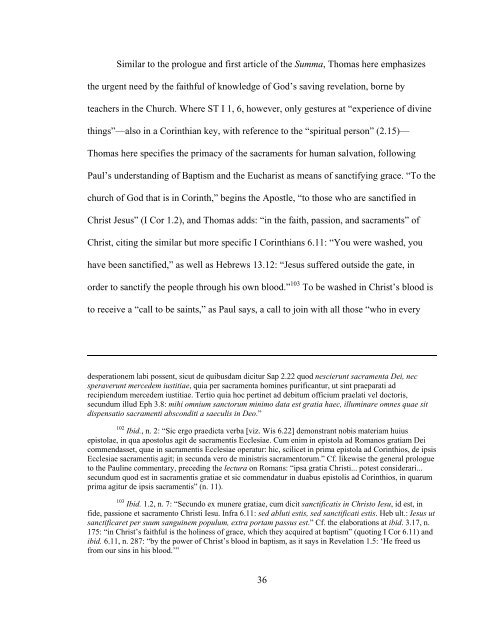SACRAMENTS OF THE INCARNATE WORD - ETD - University of ...
SACRAMENTS OF THE INCARNATE WORD - ETD - University of ...
SACRAMENTS OF THE INCARNATE WORD - ETD - University of ...
Create successful ePaper yourself
Turn your PDF publications into a flip-book with our unique Google optimized e-Paper software.
Similar to the prologue and first article <strong>of</strong> the Summa, Thomas here emphasizes<br />
the urgent need by the faithful <strong>of</strong> knowledge <strong>of</strong> God’s saving revelation, borne by<br />
teachers in the Church. Where ST I 1, 6, however, only gestures at “experience <strong>of</strong> divine<br />
things”—also in a Corinthian key, with reference to the “spiritual person” (2.15)—<br />
Thomas here specifies the primacy <strong>of</strong> the sacraments for human salvation, following<br />
Paul’s understanding <strong>of</strong> Baptism and the Eucharist as means <strong>of</strong> sanctifying grace. “To the<br />
church <strong>of</strong> God that is in Corinth,” begins the Apostle, “to those who are sanctified in<br />
Christ Jesus” (I Cor 1.2), and Thomas adds: “in the faith, passion, and sacraments” <strong>of</strong><br />
Christ, citing the similar but more specific I Corinthians 6.11: “You were washed, you<br />
have been sanctified,” as well as Hebrews 13.12: “Jesus suffered outside the gate, in<br />
order to sanctify the people through his own blood.” 103 To be washed in Christ’s blood is<br />
to receive a “call to be saints,” as Paul says, a call to join with all those “who in every<br />
desperationem labi possent, sicut de quibusdam dicitur Sap 2.22 quod nescierunt sacramenta Dei, nec<br />
speraverunt mercedem iustitiae, quia per sacramenta homines purificantur, ut sint praeparati ad<br />
recipiendum mercedem iustitiae. Tertio quia hoc pertinet ad debitum <strong>of</strong>ficium praelati vel doctoris,<br />
secundum illud Eph 3.8: mihi omnium sanctorum minimo data est gratia haec, illuminare omnes quae sit<br />
dispensatio sacramenti absconditi a saeculis in Deo.”<br />
102 Ibid., n. 2: “Sic ergo praedicta verba [viz. Wis 6.22] demonstrant nobis materiam huius<br />
epistolae, in qua apostolus agit de sacramentis Ecclesiae. Cum enim in epistola ad Romanos gratiam Dei<br />
commendasset, quae in sacramentis Ecclesiae operatur: hic, scilicet in prima epistola ad Corinthios, de ipsis<br />
Ecclesiae sacramentis agit; in secunda vero de ministris sacramentorum.” Cf. likewise the general prologue<br />
to the Pauline commentary, preceding the lectura on Romans: “ipsa gratia Christi... potest considerari...<br />
secundum quod est in sacramentis gratiae et sic commendatur in duabus epistolis ad Corinthios, in quarum<br />
prima agitur de ipsis sacramentis” (n. 11).<br />
103 Ibid. 1.2, n. 7: “Secundo ex munere gratiae, cum dicit sanctificatis in Christo Iesu, id est, in<br />
fide, passione et sacramento Christi Iesu. Infra 6.11: sed abluti estis, sed sanctificati estis. Heb ult.: Iesus ut<br />
sanctificaret per suum sanguinem populum, extra portam passus est.” Cf. the elaborations at ibid. 3.17, n.<br />
175: “in Christ’s faithful is the holiness <strong>of</strong> grace, which they acquired at baptism” (quoting I Cor 6.11) and<br />
ibid. 6.11, n. 287: “by the power <strong>of</strong> Christ’s blood in baptism, as it says in Revelation 1.5: ‘He freed us<br />
from our sins in his blood.’”<br />
36
















